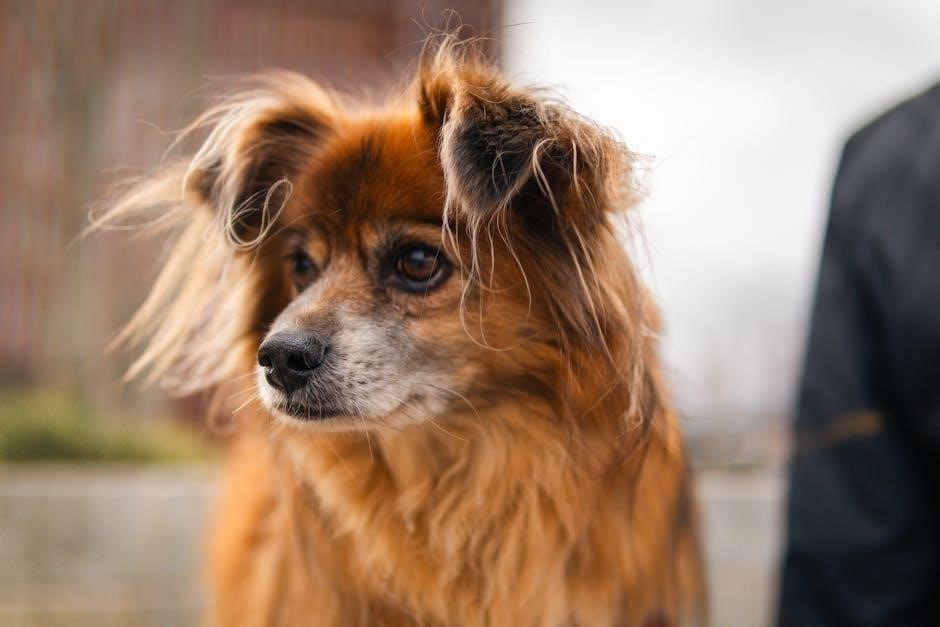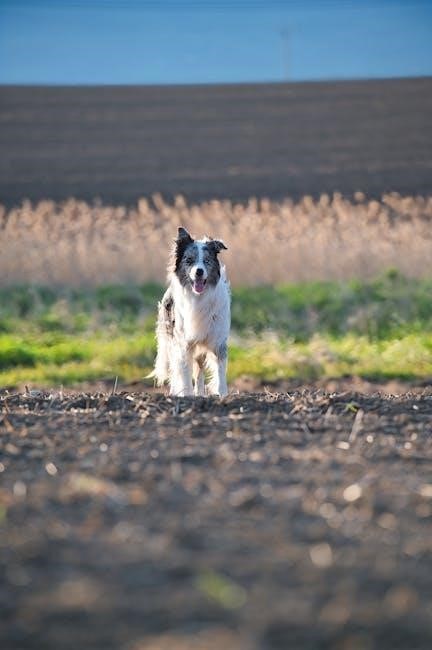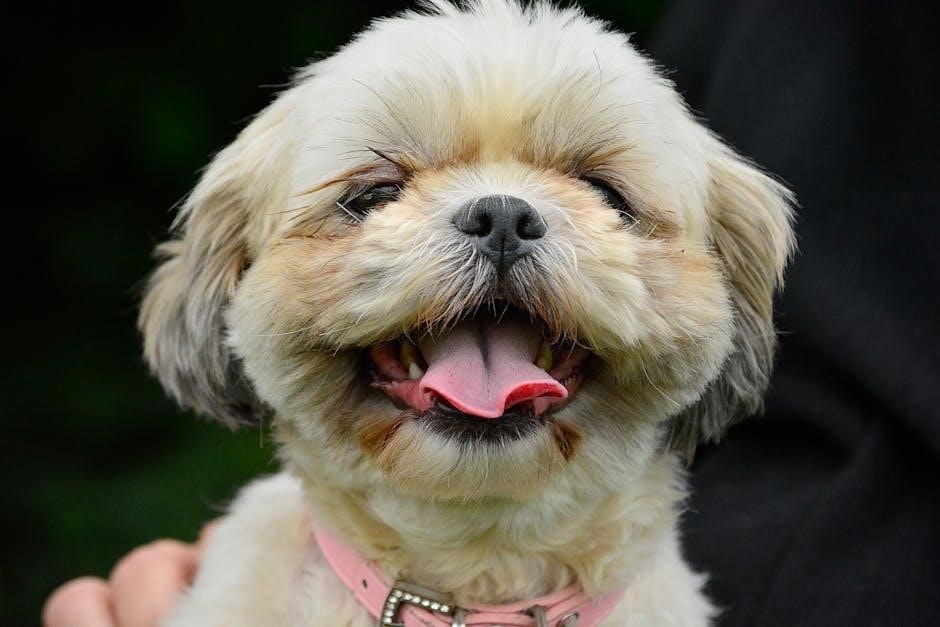The Volhard Puppy Aptitude Test‚ developed by Jack and Wendy Volhard‚ evaluates a puppy’s inherited traits to predict future behavior and working ability. Widely used by breeders and trainers‚ the test assesses social attraction‚ confidence‚ and problem-solving skills‚ providing insights into a puppy’s potential as a companion or working dog.
What is the Volhard Puppy Aptitude Test?
The Volhard Puppy Aptitude Test (PAT) is a widely recognized evaluation tool designed to assess a puppy’s temperament‚ inherited traits‚ and potential behavior. Conducted when puppies are 49 days old‚ the test evaluates social attraction‚ confidence‚ and problem-solving skills. It involves a series of exercises‚ such as testing a puppy’s reaction to strangers‚ loud noises‚ and physical challenges‚ to determine traits like dominance‚ submission‚ and curiosity. The results help predict a puppy’s suitability for roles such as companionship‚ working‚ or competitive activities. The test is particularly valued by breeders and trainers for identifying puppies with strong potential for specific tasks or environments. Its structured approach ensures consistent and reliable outcomes‚ making it a cornerstone in canine behavioral assessment.
Importance of the Test in Puppy Development
The Volhard Puppy Aptitude Test plays a crucial role in puppy development by providing insights into a puppy’s temperament and potential. It helps breeders identify puppies with traits suitable for specific roles‚ ensuring they are placed in appropriate environments. The test also aids owners in understanding their puppy’s behavior‚ enabling tailored training and socialization. By evaluating traits like confidence and problem-solving skills‚ the test supports informed decisions about a puppy’s future‚ whether as a companion or working dog. This early assessment contributes to better outcomes for both puppies and owners‚ fostering a more harmonious and effective development process from an early age.

Overview of the Volhard Puppy Aptitude Test
The Volhard Puppy Aptitude Test evaluates puppies through a series of exercises assessing traits like social attraction‚ confidence‚ and problem-solving. Designed for puppies around 49 days old‚ it helps predict future behavior and working potential‚ guiding breeders and owners in raising well-adjusted dogs.
Structure and Components of the Test
The Volhard Puppy Aptitude Test consists of a series of exercises designed to evaluate a puppy’s temperament‚ social behavior‚ and problem-solving abilities. Conducted when puppies are 49 days old‚ the test includes ten specific assessments‚ such as reactions to strangers‚ confidence in new environments‚ and responses to loud noises. Each exercise is carefully structured to reveal innate traits that predict future behavior. The test is non-invasive and relies on natural interactions‚ ensuring accurate results. Breeders and owners use these insights to guide training‚ socialization‚ and placement decisions‚ helping puppies thrive in their intended roles as companions or working dogs. The test’s standardized format ensures consistency and reliability across evaluations.
When and How to Conduct the Test
The Volhard Puppy Aptitude Test should be conducted when puppies are 49 days old‚ as this age is critical for assessing inherited traits before they go to their new homes. The test must be performed in a neutral‚ quiet environment with minimal distractions to ensure accurate results. An evaluator‚ ideally someone unfamiliar to the puppy‚ administers the test to avoid bias. The process involves a series of exercises designed to evaluate the puppy’s reactions to various stimuli‚ such as strangers‚ loud noises‚ and problem-solving challenges. Each exercise is non-invasive and stress-free for the puppy. Conducting the test at the right age and under the correct conditions ensures reliable insights into the puppy’s temperament and potential. Proper timing and preparation are essential for obtaining meaningful results.
Test Environment and Requirements
The Volhard Puppy Aptitude Test requires a controlled environment to ensure accurate results. The testing area should be quiet‚ free from distractions‚ and large enough for the puppy to move comfortably. The surface should be non-slippery to prevent anxiety or accidents. Lighting must be neutral to avoid startling the puppy. The evaluator should be unfamiliar to the puppy to assess its reactions objectively. All necessary props‚ such as a hidden treat bag‚ gloves‚ and a toy‚ should be prepared in advance. The puppy must be well-rested‚ fed‚ and free from stress to ensure its natural behavior is observed. By maintaining these conditions‚ the test provides a reliable assessment of the puppy’s temperament and potential;

Evaluation Criteria and Scoring
The Volhard Puppy Aptitude Test uses a scoring system to evaluate traits like social attraction‚ confidence‚ and problem-solving. Scores predict future behavior and working potential.
Understanding the Scoring System
The Volhard Puppy Aptitude Test employs a scoring system where each exercise is rated from 1 to 5‚ reflecting a puppy’s reactions. A score of 1 indicates a weak response‚ while 5 shows a strong‚ desirable trait. The cumulative score helps identify tendencies such as dominance‚ submission‚ or balance. Breeders use these scores to match puppies with suitable homes or roles. The test’s standardization ensures consistency‚ making it a reliable tool for evaluating temperament and potential. By understanding the scoring‚ owners can better guide training and socialization efforts. This systematic approach aids in predicting adult behavior‚ enhancing decision-making for both breeders and owners.
Key Traits Assessed in the Test
The Volhard Puppy Aptitude Test evaluates key traits such as social attraction‚ confidence‚ and problem-solving ability. It assesses how a puppy interacts with people‚ handles stress‚ and responds to new environments. The test also examines courage‚ curiosity‚ and willingness to follow authority. These traits are crucial for predicting a puppy’s future behavior as a companion or working dog. By observing reactions to stimuli like loud noises‚ strangers‚ and physical challenges‚ the test provides insights into a puppy’s temperament and potential. This comprehensive evaluation helps breeders and owners make informed decisions about a puppy’s suitability for various roles‚ ensuring proper placement and training. The test’s focus on inherited traits makes it a valuable tool for understanding a puppy’s behavioral foundation.
Interpreting Results for Breeders and Owners
Interpreting the Volhard Puppy Aptitude Test results helps breeders and owners understand a puppy’s potential and behavioral tendencies. The test scores highlight strengths in areas like social attraction‚ confidence‚ and problem-solving‚ guiding decisions for breeding or training. Breeders can identify traits that align with their breeding goals‚ while owners gain insights into their puppy’s personality and needs. High scores in certain categories may indicate a puppy’s suitability as a working or therapy dog‚ while lower scores might suggest a need for additional socialization or training. By analyzing the results‚ breeders and owners can make informed choices to nurture the puppy’s abilities and address potential challenges early on‚ ensuring the best possible outcomes for both the puppy and its future family.

Practical Applications of the Test
The Volhard Puppy Aptitude Test provides actionable insights for breeders and owners‚ guiding decisions on breeding‚ training‚ and placement. It helps tailor socialization and training plans.
Using Test Results for Breeding Decisions
Breeders utilize Volhard test results to identify puppies with desirable traits‚ such as confidence‚ trainability‚ and social adaptability. By evaluating these inherited tendencies‚ breeders can make informed decisions about which dogs to include in their breeding programs. High-scoring puppies in key areas like courage and problem-solving are often selected to produce offspring with similar qualities. This approach helps maintain breed standards and improves litter outcomes. Additionally‚ the test highlights potential genetic weaknesses‚ allowing breeders to avoid passing on undesirable traits. Responsible breeding practices are enhanced as breeders prioritize puppies that align with their program’s goals‚ ensuring healthier‚ well-tempered dogs for future generations. This strategic use of test results contributes to the overall quality of breeding efforts.
Guiding Puppy Training and Socialization
The Volhard Puppy Aptitude Test provides valuable insights for tailoring training and socialization programs to a puppy’s individual needs. By identifying strengths and weaknesses in areas like courage‚ sensitivity‚ and problem-solving‚ owners and trainers can create targeted strategies to enhance development. For instance‚ a puppy showing high independence may require more engagement and social interaction to build trust. Conversely‚ a sensitive puppy might benefit from gentle‚ positive reinforcement techniques to build confidence. The test results also highlight areas where early intervention is crucial‚ such as fearfulness or aggression‚ allowing for proactive socialization. This personalized approach ensures puppies are well-prepared for their roles‚ whether as family pets or working dogs‚ fostering a strong foundation for lifelong learning and adaptability.
The Volhard Puppy Aptitude Test remains a cornerstone in dog breeding and training‚ offering insights into puppy development while guiding breeders and owners toward informed decisions‚ ensuring optimal outcomes.
The Role of the Volhard Test in Modern Dog Breeding
The Volhard Puppy Aptitude Test plays a pivotal role in modern dog breeding by providing breeders with a standardized method to evaluate a puppy’s temperament and potential. By assessing traits like social attraction‚ confidence‚ and problem-solving skills‚ the test helps identify puppies suited for specific roles‚ whether as companions or working dogs. This insight enables breeders to make informed decisions about breeding programs‚ ensuring the preservation of desirable traits and improving breed standards. The test also supports responsible breeding practices by matching puppies with appropriate owners‚ reducing the likelihood of behavioral issues. Its widespread adoption underscores its value in advancing the quality and purpose of dog breeding worldwide.
Future Developments and Improvements

Future developments of the Volhard Puppy Aptitude Test may focus on integrating advanced technologies to enhance its administration and analysis. Digital platforms could streamline the testing process‚ offering breeders and owners real-time insights and scoring. Artificial intelligence might be employed to analyze test results more objectively‚ reducing human bias and providing deeper behavioral insights. Additionally‚ there may be efforts to expand the test’s scope to include more diverse breeds or to adapt it for use in different cultural contexts. Researchers could also explore longitudinal studies to track the long-term validity of the test’s predictions. These improvements aim to make the Volhard test even more effective in guiding responsible breeding and ownership‚ ensuring it remains a cornerstone of canine behavioral assessment for years to come.